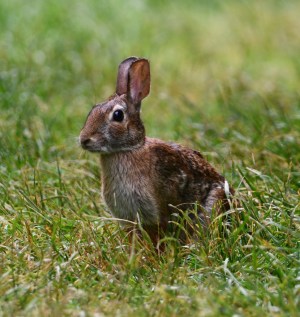Species Highlight: Eastern Cottontail Rabbit
 Have you noticed more cottontail rabbits in your neighborhood this year? 2023 is the year of the rabbit in the Chinese zodiac. What a coincidence then that the rabbit population in Johnson County, according to local biologists, is high this year. Why would that be? Is it something to worry about?
Have you noticed more cottontail rabbits in your neighborhood this year? 2023 is the year of the rabbit in the Chinese zodiac. What a coincidence then that the rabbit population in Johnson County, according to local biologists, is high this year. Why would that be? Is it something to worry about?
To survive and reproduce, cottontail rabbits need cover and food. In suburban environments, cover in the form of tall grass and shrubs can be found in many backyards, as can a bounty of rabbit food. The diet for cottontails includes white clover, grasses, and wheat. You may even notice that your garden has been mysteriously nibbled on. Cottontails are particularly fond of broccoli, lettuce, beans, and flowers such as marigolds (a helpful guide to protecting your garden from rabbits can be found at Rabbit Damage Prevention in the Landscape (k-state.edu)).
According to Fort Hays Kansas Mammal Atlas, it is common for rabbit populations to fluctuate from year to year. This is partly due to both their ability to prolifically reproduce when resources are plentiful and the rate at which they are preyed upon. With a short gestation period of only 28 to 30 days, females can have as many as seven litters between early spring and late autumn. Each litter has an average of 3 to 4 young. This reproductive strategy is necessary because of the low survival rate of nestlings and juveniles. Only 25% of cottontails surpass the age of five months, and most adults only live to the age of one year. Predators such as hawks, owls, foxes, and coyotes predate heavily on cottontails, keeping their populations in check. When cottontail populations increase, predator populations tend to increase in response. This leads to a natural fluctuation from year to year.
2023 has been a good year for cottontail rabbits. Will 2024 continue the trend?
Sources: Fort Hayes State University - Kansas Mammal Atlas; Kansas Department of Wildlife and Parks; Kansas Wildlife Federation; Emporia State University
back to Natural Resources Agent articles